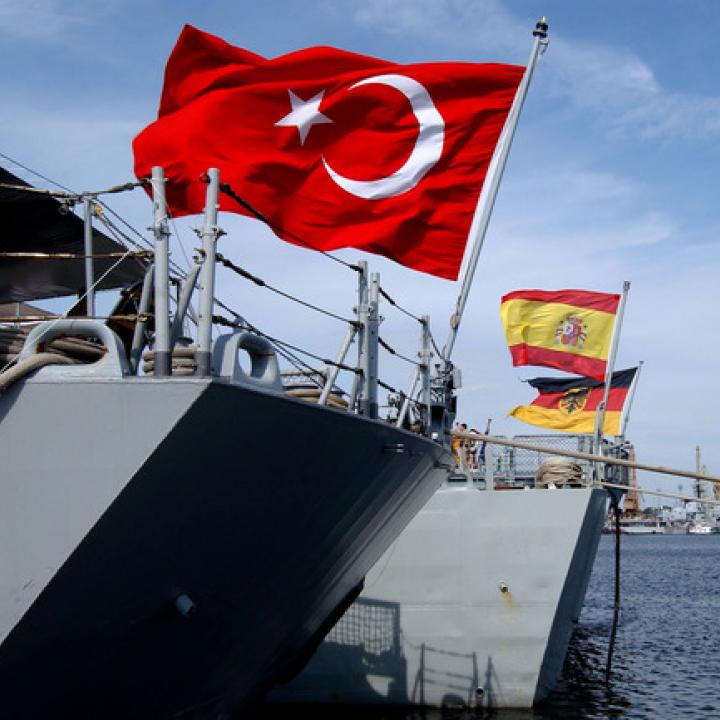

Although Turkey has found comfort in NATO’s security, Ankara’s long-term commitment to the alliance should not be taken for granted: Turkey has at least two strategic alternatives to NATO.
Only a few years ago, Turkey’s commitment to NATO was in doubt. Some were even suggesting that Turkey would abandon the alliance -- or that at least, the alliance should seriously lower its expectations.
But recent events in Syria, including last week's downing of a Turkish plane by Damascus, and Turkish-Iranian competition in the Middle East have been increasing NATO's worth for the Turks.
Turkey has also signed up to join NATO’s missile-defense project, putting its name under what has been NATO’s core mission for decades: meeting common threats with common action by democratic states. (In this modern-day example, Iranian missiles are the threat in question, not Russian tanks.)
For the moment, at least, Turkey has found comfort in NATO’s security. But Ankara’s long-term commitment to the alliance should not be taken for granted: Turkey has at least two strategic alternatives to NATO.
The first is remaining ideologically agnostic, grouping with other emerging economic powers to maintain a truly nonaligned and balanced strategic approach. This entails acting in unison with the BRICs -- Brazil, Russia, India and China. (Though the “R” in that acronym could go missing if Turkish-Russian differences on Syria are exacerbated further.)
The second alternative is to recognize that Turkey has more in common with other emerging democracies than with economically dynamic authoritarian regimes. This form of nonalignment would place Turkey in a wider group referred to as IBSATI -- India, Brazil, South Africa, Turkey and Indonesia. Although IBSATI would leave more room for Turkish cooperation with the West than BRIC alignment, it could still preclude joint coordination with NATO.
For now, BRIC remains an analytic tool for investors more than for geo-strategists, and IBSATI is more of a pipe dream. Nevertheless, NATO should jealously promote and guard its “leading acronym” status in Ankara.
Buoyed by record-breaking economic growth over the past decade, the Turks are, once again, feeling powerful. Consequently, many Turks view world politics according to their desire to become a global player. So to maintain Turkey’s long-term commitment to NATO, the alliance should consider making Ankara feel important.
It could, for instance, design a program for new democracies in the Arab world, similar to its post-Soviet Partnership for Peace initiative, and grant Turkey status as the lead nation in this endeavor. A NATO mechanism with a heavy Turkish flavor would excite far fewer antibodies among Arab partners than bilateral security cooperation programs run by individual Western nations. It would also give NATO an opportunity to invest in Turkey without a large armed presence.
For its part, the United States could cement Ankara’s commitment to NATO by protecting Turkey’s most vulnerable security flank: the Kurdistan Workers Party. Whenever Washington has appeared tone-deaf to Turkish concerns over Kurdish separatism and terrorism, as it did in the run-up to the Iraq war, Ankara’s response has been predictably bad.
On a practical level, NATO has made it clear that it sees Turkey as an indispensable member. During the recent NATO summit in Chicago, Turkey featured prominently in discussions of the alliance’s future strategic posture and defense capabilities. This conviction was further underlined with NATO’s recent decision to switch its land forces headquarters from Ramstein, Germany, to Izmir, Turkey.
Indeed, Turkey remains a necessary cornerstone of NATO as much in 2012 as it did in 1952. This is the silver lining of the Arab Spring: Turkey’s commitment to NATO, now revived, can be boosted further.
Soner Cagaptay directs the Turkish Research Program at The Washington Institute. Col. Richard Outzen is a foreign area officer in the U.S. Army.
CNN Global Public Square




